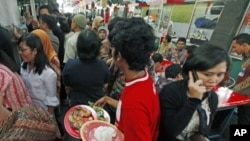The United Nations Food and Agriculture Organization is calling for international cooperation to address rising food prices in Asia. The FAO says the cost of some staples has reached an all-time high and that measures are needed to protect the poor and prevent prices from getting out of control.
United Nations data show the cost of food in February reached the highest ever recorded.
Wednesday in Bangkok, the United Nations Food and Agriculture Organization said in Asia the retail price of rice, the major staple, rose in Bangladesh by 33 percent from last year and in China and Indonesia by 23 percent.
REUTERS
A woman waits in line to buy subsidized rice in Bangladesh.Representatives from 20 Asian countries, international organizations, the United States, and Japan gathered in Bangkok Wednesday to address rising food prices.
The two-day conference is the first of a series the FAO is organizing around the world to address food security.
Rising costs
The delegates heard that rice costs are likely to stabilize this year because the region’s major producers, Thailand and Vietnam, are having good harvests. But FAO officials warn that rising fuel prices could push costs up further.
Hiroyuki Konuma, the FAO's representative for Asia and the Pacific, says that Asia’s poor, who spend up to 70 percent of their incomes on food, are the worst affected by inflation.
"You will recall that combination of food price and economic crisis of 2008, 2009 pushed an additional over 100 million into chronic hunger," he says. "We are experiencing a potential risk of similar setback at moment due to recent high and volatile food prices."
Stockpiling
Food price increases in 2007 and 2008 led some countries in the region to stockpile food and temporarily ban grain exports. The price of rice quickly doubled.
The United States ambassador to the U.N. agencies in Rome, Ertharin Cousin,says that crisis was caused almost entirely by export restrictions and panic buying, which governments must avoid.
"In the short term, countries can reduce the risks from food price spikes by increasing transparency and sharing information on stocks and production, abstaining from export bans and using quotas and taxes sparingly, avoiding panic buying and hoarding, reducing import taxes, and putting in place targeted safety nets for the most vulnerable," Cousin says.
The Association of Southeast Asian Nations, China, Japan, and South Korea this year are establishing a strategic rice reserve for emergencies.
And the South Asian Association for Regional Cooperation says it has doubled its food reserves since last year and plans to open a regional seed bank.
Reaction in Asia
Javed Hussain Mir, a regional director at the Asian Development Bank, says so far only Asian countries have responded aggressively to rising food prices.
"But, as we are increasingly experiencing with these prices, arresting domestic food inflation with lasting solutions requires that, more than ever, that the collective efforts of everyone involved in the local and international food supply chains are brought to bear on the process," he says.
To prevent price spikes in the long-term, the FAO’s Konuma says governments and multilateral organizations must increase investment in agriculture and food production, which, he points out, has been neglected.
Konuma says the proportion of development assistance spent on agriculture declined from 20 percent in the 1980s to five percent today, and that national budgets for rural development have followed a similar trend.





